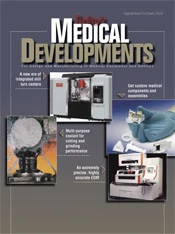Attention has been focused on numbers of medical devices that are to be studied after approval. Regulators charged with the responsibility are doing a poor job of monitoring the research, according to the Institute of Health (IOM), an independent nonprofit organization the studies scientific issues, most on behalf of governmental agencies.
Since most devices are aimed at use for adult patients, according to IOM there are questions about their effects on children. The IOM notes that the Food and Drug Administration (FDA) doesn't know which trials are underway or completed and is unable to say which studies involve children or matters that pertain particularly to them.
FDA has made some attempts at improvement, including establishment of an electronic system to monitor the status of post-approval studies. The study is in response to a request from the Congress. IOM suggests that Congress broaden the FDA's powers for requiring post-approval studies.

Explore the September 2005 Issue
Check out more from this issue and find your next story to read.
Latest from Today's Medical Developments
- Turnkey robotic systems are already behind the times
- You can still register for March’s Manufacturing Lunch + Learn!
- HERMES AWARD 2025 – Jury nominates three tech innovations
- Vision Engineering’s EVO Cam HALO
- How to Reduce First Article Inspection Creation Time by 70% to 90% with DISCUS Software
- FANUC America launches new robot tutorial website for all
- Murata Machinery USA’s MT1065EX twin-spindle, CNC turning center
- #40 - Lunch & Learn with Fagor Automation





